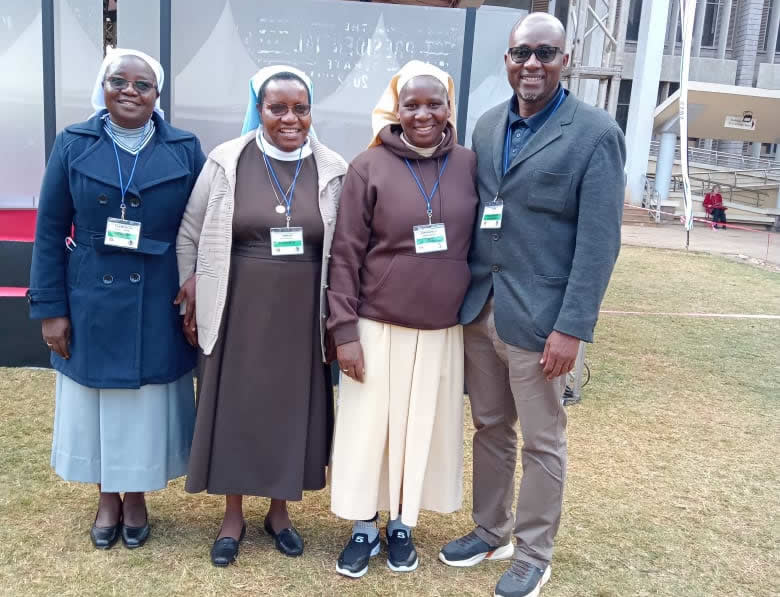…. Call for Gospel-driven servant leadership in churches
Advancing healthy dialogue between churches, collaboration with other churches, faith communities, civil authorities, and social actors as well as the dismantling of cultural structures that limit the rights of women and children to self-actualization have been identified as critical steps that must be taken towards building a synodal and vital Church in Africa.
These are some of the take away at the end of Second Pan-African Catholic Congress on Theology, Society and Pastoral Life which took place from 18 – 23 July, 2022 at The Catholic University of Eastern Africa in Nairobi, Kenya with the theme: “Walking together for a vital church in Africa and in the world” with focus on Synodality; the experiences of African women and children; and the challenges and prospects of building a vital Church in Africa.
A communique issued at the end of the event which was signed by Bishop Hiiboro Kussala of Tamburo Yambio of Sudan and Sr Josee Ngalula, reported that about 180 theologians who attended the conference focused on multiple issues including ways to strengthen the mutual collaboration of institutes of religious life, the developing processes of palaver and reverential dialogue in the local churches; the new models of leadership of communities and institutions that are so necessary for the renewal of the churches; the recognition of the place of the laity, especially the place of women; the social dimension of synodality that includes interaction with the protagonists of civil society; and the experiences of accompaniment with diverse human experiences marked by poverty and marginalization in need of friendship and hospitality.

The conference affirmed commitment to “the full participation of the whole people of God in the life of the Church. In particular, we call for a Gospel-driven servant leadership in our churches that overcomes clericalism and samaritanizes the wounded, the broken and those at the existential peripheries”.
It went further to stress that “vision of synodality must also include a prophetic collaboration with our African societies, and their particular ecological and social challenges, guided by the wisdom of Laudato Si’ and Fratelli Tutti.
“We commit to a synodal relationship with the world at-large. This includes collaborating with partners around the world who work towards justice, peace, and reconciliation as seeds of the kingdom of God”.
On the socio-cultural barriers affecting women, children and the African church, the conference continued,
“We commit to a critical engagement with the cultural structures playing out in our African societies that limit the rights of women to self-actualization.
“We commit to advocating for the eradication of the practices of different kinds of abuse of women and girls, for example, sexual abuse, forced marriages, gender mutilation, new forms of slavery, and human trafficking.
“We commit to fully supporting, promoting, and advocating for the flourishing of women and girls in our African societies and churches.
“We commit to embracing policies that are intended to protect our children henceforth from all forms of abuses in families, churches, and society.
“We commit to celebrating the gifts and talents of our children and empowering them to a full realization of their dreams.
“We commit to developing networks of collaboration between churches in Africa and beyond to enhance prophetic Christian witness in the world.
“We commit to advancing a healthy dialogue between churches, religions, and African spiritual traditions for the purpose of mutual growth and peace.
“We commit ourselves to listening, dialoguing, and collaborating with other churches, faith communities, civil authorities, and social actors to promote a sustainable way of life in our continent and world”.
The Congress also identified many positive initiatives playing out in the ecclesial communities, and social contexts just as it magnified the hurdles militating the attainment of the full potential of the African continent from being called a home.
The theologians admitted that the complex social problems that afflict the church in the continent show how important it is that the synodal spirit – “walking together”–becomes a source of inspiration for ethical, ecclesial, and political commitments.
Taking cognizance of the Pope Francis’s invitation to the whole Church to embrace Synodality, the catholic thinkers focused on the mutual collaboration of institutes of religious life, the Catholic universities in Africa, the developing processes of palaver and reverential dialogue in the local churches; the new models of leadership of communities and institutions that are so necessary for the renewal of the churches; the recognition of the place of the laity, especially the place of women; the social dimension of synodality that includes interaction with the protagonists of civil society; and the experiences of accompaniment with diverse human experiences marked by poverty and marginalization in need of friendship and hospitality.
According to Rev. Fr. Prof Stan Ilo one of the coordinators of the conference, the vision of the Pan-African Catholic Theology and Pastoral Network is to bridge the gap between pastoral practices, scientific, and multi-disciplinary works in the continent. He explained that the conference is about listening to God, the cry of our Mother Earth, and to the concerns of our people, in order to help them live flourishing lives rooted in the Christian faith and African spiritual and religious traditions.
The maiden edition of the conference took place at Bigard Memorial Seminary, Enugu, Nigeria in December 5-8, 2019 and focused on sharing the inspiration to accomplish the works of God.







